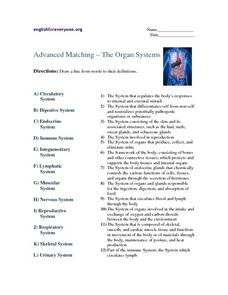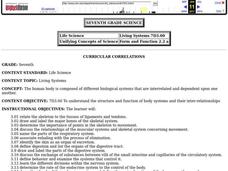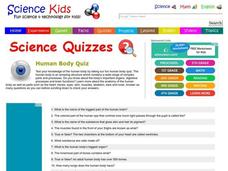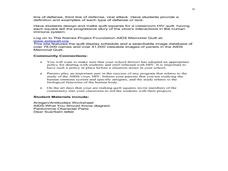Tinybop
The Human Body
Examine the systems of the human body with a bold, charming, and kid-friendly application. This noteworthy tool is certain to get kids interested what goes on inside of them! The eye feature uses the tablet camera to view images and show...
Southwest Educational Development Laboratory
The Human Body
Nothing is more relevant than the study of the human body. A series of 10 human body lessons begins with growth, ends with reproduction, and hits all the major systems in between. Each lesson provides opening and closing activities as...
Curated OER
Exercise and the Human Heart
Interpret data and learn about the human heart in one activity! After learning about the way blood flows in the body, fifth graders answer two questions about a graph displaying pulse rate. They then take their own pulses to find the...
Curated OER
Advanced Matching - The Organ Systems
What's the difference between the digestive system and the endocrine system? Explore 12 body systems in this anatomy matching worksheet, for which learners find descriptions corresponding to anatomical terminology. Some of the...
Curated OER
Human Body Systems
Seventh graders investigate the structure and function of body systems and their inter-relationships. They draw and label the major body systems, observe demonstrations of various body systems, define key vocabulary terms, and compare...
Curated OER
Body Systems
In this body systems lesson, students work in small groups conduct research to become an 'expert' on one of the 7 body systems. Students present their findings to the class via power point, poster, or song.
Curated OER
Body Organization and Structure
In this human body organization and structure worksheet, students complete 21 fill in the blank questions in the format of word scrambles, riddles, and puzzles.
American Museum of Natural History
What Do You Know About the Human Microbiome?
Scholars answer 10 multiple choice questions to test their knowledge about the human body and microbes. Correct answers come with a rewarding tone and brief description.
Curated OER
You've Got to Have Heart
After reading an excellent description of the human heart, fifth graders look at a drawing of a human body, and choose the circle they think represents where the human heart is found. There are four circles inside the character's chest....
Curated OER
Excretory System
In this human anatomy worksheet, students complete a crossword puzzle with 14 vocabulary terms about the Human Excretory System.
Curated OER
English Exercises: Mysteries of Anatomy
Consider this online interactive activity as a way to practice the names that often accompany human anatomy, such as the crown of the head and the roof of the mouth. Learners select an anatomy word with a double meaning from a drop-down...
Curated OER
Life Cycle: Diversity in a Balance 4th Grade Workbook
In this life cycle workbook, 5th graders examine plant and animal cells, classification of organisms, human biology, photosynthesis, and natural environments. 21 different activities make up the Life Cycle Workbook.
Curated OER
Skin: Skin Prints
Students explore human anatomy by participating in a print experiment. In this human skin lesson, students define the term "epidermis" and utilize computer paper, pencils, tape and baby wipes to create a print of their own skin. Students...
Teach Engineering
Skin and the Effects of Ultraviolet Radiation
Though UV radiation can damage skin, it isn't all bad. The third installment in a six-part series allows the class to study the structure and function of skin. They learn about the different types of skin cancer and the SPF rating...
Curated OER
Integumentary System: A System, An Organ, the Biggest!
It is only six short slides, but an acceptable outline of the integumentary system. General facts about the system, layers, sublayers, and functions are listed as bullet-points. What would make this presentation more engaging for your...
Curated OER
The Human Body
Students research information about the human body. They read books and explore the Internet to gather information about the human body. Students create graphic representations and models of the body systems. Working in groups, they...
Curated OER
The Human Body
In this human body activity, students will review the characteristics of the body systems: skeletal, circulatory, muscular, digestive, urinary, endocrine, reproductive, lymphatic, and respiratory systems. This activity has 12 fill in the...
Curated OER
Human Body Quiz
In this human body learning exercise, students complete short answer questions about the organs in the body and their functions. Students complete 20 questions.
Curated OER
Antibiotic Attack
Young scholars examine how antibiotics work and why they are effective. In this antibiotic lesson, students discover that when harmful germs get inside the body, the immune system may not be strong enough to fight the germs off. Young...
Scholastic
Study Jams! The Immune System
A set of slides depicts sick children, an artistic rendition of a white blood cell amongst red blood cells, and a diagram of part of the lymph system to teach youngsters about immunity. Kids will find that it is made up of skin, white...
Curated OER
Planet Dermis : Danger! Monster Skin Attacks
In this human anatomy worksheet, students learn about different "skin attacks". They unjumble the letters and complete the spelling of the words. There are 6 words to unscramble on the page.
University of Minnesota
Homeostasis of Thermoregulation
Whether you're battling the flu or trying to warm up on a chilly day, your body's ability to react to temperature change is fascinating! Anatomy scholars discover the fantastic feedback loops that control body temperature in a rigorous...
Curated OER
The Circulatory System--Part III
Students research the process for the preparation of a soup. Students explore the safety issues of food preparation. Students, after presenting their soups to the class, will eat their soups that they have prepared.
Curated OER
Antigens versus Antibodies "KO'd in Round Three" The Third Line of Defense of the Human Immune System
Seventh graders investigate antibodies, as the body's third line of defense against disease. They discover why antibodies do not defend the body against viruses and create a pantomime of the antibody/antigen/HIV relationship.

























